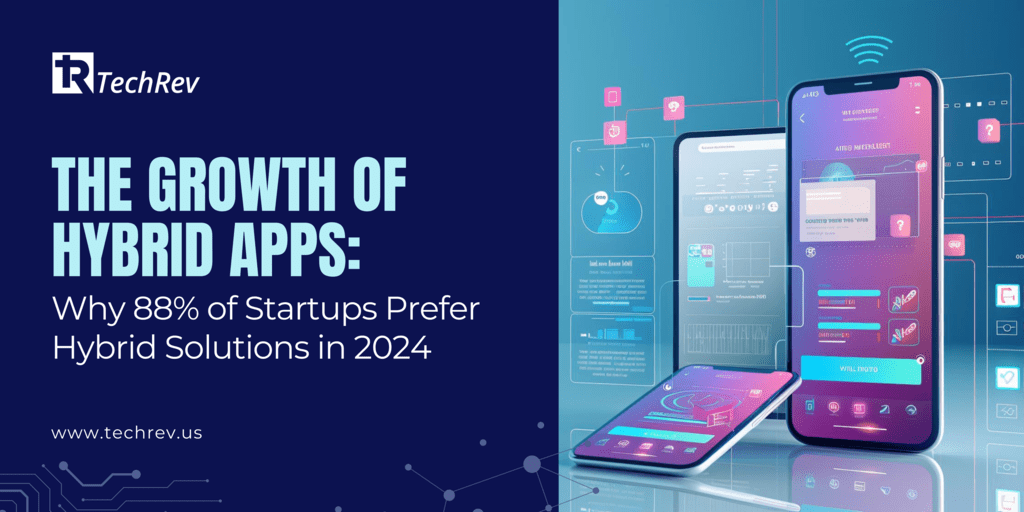
Did you know that by 2024, 88% of startups are choosing hybrid app development over native solutions? This growing trend isn’t just a passing phase—it’s being driven by the need for flexibility, cost-efficiency, and faster time-to-market. Recognized brands like Instagram and Uber have already embraced hybrid development, reaping the benefits of a single codebase for multiple platforms. This shift in preference highlights the undeniable advantages of hybrid apps in today’s competitive market.
Looking ahead to 2025, the hybrid app market is already ready for even greater expansion, as more businesses recognize its potential. This blog will explore why startups are leaning towards hybrid solutions and what makes them so appealing.
Why Startups are Embracing Hybrid Solutions?
In 2024, an estimated 9,000 startups, based on industry trends and reports, have opted for hybrid app development solutions between January and September. This growing trend highlights how hybrid apps offer startups a strategic advantage in the market by enabling faster development cycles and reducing costs. With a single codebase, startups can target both iOS and Android users, reaching a broader audience with minimal resources. Hybrid solutions also provide the flexibility to quickly adapt and scale, giving startups the agility they need to compete and thrive in a fast-paced, ever-changing market.
Technical Benefits Startups Can Leverage Using Hybrid App Development
- Single Codebase for Multiple Platforms
Startups with a hybrid app development solution have the flexibility to write one codebase. This allows applications to work seamlessly across both iOS and Android platforms, reducing development time and effort. It also allows startups to launch their apps faster and reach a wider audience from the start.
- Cost Efficiency
As mentioned above startups are taking advantage of a single codebase, which eventually is helping them save on development costs. As a result, this cost efficiency helps them utilise their limited budgets for different operational activities.
- Faster Time-to-Market
Hybrid apps can be developed and deployed much quicker than native apps. The accelerated development process enables startups to get their products to market faster, staying ahead of competitors.
- Easier Maintenance and Updates
Maintaining and updating hybrid apps is more straightforward because changes only need to be made to one codebase. This simplifies the process and reduces the time and resources needed for ongoing app maintenance.
- Offline Access and Enhanced Performance
Hybrid apps can cache data locally, allowing users to access content even when offline. This feature, combined with optimized performance across devices, ensures a smooth user experience, which is critical for customer retention.
- Scalability and Flexibility
Hybrid apps offer greater scalability, allowing startups to easily expand their apps with new features or adapt to market demands. This flexibility is critical for startups that need to pivot quickly in response to user feedback or market changes.
- Access to Native Features
Hybrid frameworks like React Native and Flutter provide access to device-specific features like GPS, camera, and notifications, offering users a near-native experience without compromising performance.
- Simplified Testing Process
With one codebase to test, the QA process becomes more efficient. Startups can quickly identify and fix issues, ensuring a more reliable app experience across different devices and platforms.
- Broader Reach with Web Technologies
Hybrid apps are built using popular web technologies like HTML, CSS, and JavaScript, making it easier for startups to find skilled developers and leverage existing web development expertise to build robust mobile apps.
Real-World Success: How Hybrid App Development Is Empowering Startups
In 2023, many startups leveraged hybrid app development to achieve rapid growth and market success. For instance, originally a startup, Instagram utilized hybrid development to enhance its app’s performance across multiple platforms, contributing to its massive user base and ongoing popularity. Similarly, Airbnb implemented hybrid technologies to streamline its app’s functionality, significantly boosting user engagement and revenue. These examples underscore how hybrid app development allows startups to quickly scale, reach broader audiences, and improve their market presence. As more startups adopt hybrid solutions, they are poised to benefit from the flexibility, cost-efficiency, and scalability this approach offers, positioning themselves for long-term success in the competitive tech landscape.
Why Hybrid Apps Are the Future: Trends and Predictions for 2025 and Beyond
As hybrid app development continues to rise in popularity, several trends are expected to define its evolution in 2025. The integration of advanced technologies like AI, machine learning, and AR/VR is set to enhance the capabilities of hybrid apps, making them more interactive and user-centric. These advancements will drive a significant increase in the adoption of hybrid app solutions, with projections indicating a 15-20% rise in the number of businesses opting for hybrid app development by the end of 2025. This shift will be driven by the growing need for cost-effective, scalable, and fast-to-market solutions that hybrid development uniquely offers.
Conclusion
In conclusion, hybrid app development is rapidly becoming the go-to solution for startups and established businesses alike. Its ability to provide cost efficiency, faster time-to-market, and broad platform reach makes it an attractive option. As technological advancements continue to enhance hybrid capabilities, we can expect a significant increase in adoption by 2025. Startups that choose hybrid development will be well-positioned to innovate, scale, and succeed in the competitive market landscape. Hybrid apps are not just a trend—they’re the future of mobile development.
